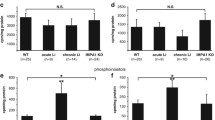Abstract.
Rationale: Lithium, an effective psychotropic agent, affects membrane phospholipid metabolism, interferes with phosphoinositide signal transduction, and antagonizes the biological activity of calcium, all major factors of protein kinase C (PKC) activation. Consequently, lithium may interfere with cellular functions requiring PKC. Supporting this hypothesis, lithium was found to inhibit increased neurotransmitter release upon PKC activation and to prevent phorbol ester-mediated PKC translocation. Objectives: The present study was undertaken to determine whether the frontal cortex of rats treated with lithium exhibits altered PKC activity and translocation in response to phorbol ester, K+, or serotonin (5-HT) receptor stimulation and to determine whether specific PKC isozymes are disproportionately affected. Methods: Rats were fed either a normal diet or one enriched with LiCl. In cerebrocortical slices or synaptosomes, cytosolic and membranous PKC activity and translocation in response to stimuli were determined after partial purification with anion exchange chromatography. Results: In brain slices, lithium treatment inhibited phorbol 12-myristate, 13-acetate (PMA)-, 5-HT-, or K+-induced PKC translocation from cytosol to membrane without affecting basal membrane or cytosolic PKC activity. In synaptosomes, lithium also attenuated PMA- or K+-evoked translocation of PKC. Immunoblotting with isozyme-specific PKC antibodies revealed that chronic lithium treatment reduced basal cytosolic αPKC and δPKC but increased membrane-associated ζPKC immunoreactivities. Stimulation with PMA, 5-HT or K+ elicited translocation of α, β and γPKC isozymes and PMA induced translocation of δ and εPKC isozymes. Stimulus-mediated translocation of PKC isozymes was attenuated in cortical tissue obtained from animals that received lithium for 6 weeks. In synaptosomes, PMA- or K+-induced PKC translocation was attenuated by in vitro lithium or chronic lithium treatment. Neither rubidium nor cesium affected PKC activities or PMA-induced translocation. Suppression of PMA-elicited translocation by lithium was partially antagonized by Ca2+. Conclusions: Lithium treatment reduces PKC translocation induced by either stimulation of a cell surface receptor or by direct enzyme stimulation with phorbol ester. This effect leads to reduced PKC-mediated phosphorylation of cellular proteins and may be responsible for the pharmacotherapeutic action of lithium.
Similar content being viewed by others
Author information
Authors and Affiliations
Additional information
Electronic Publication
Rights and permissions
About this article
Cite this article
Wang, HY., Johnson, G.P. & Friedman, E. Lithium treatment inhibits protein kinase C translocation in rat brain cortex. Psychopharmacology 158, 80–86 (2001). https://doi.org/10.1007/s002130100834
Received:
Accepted:
Issue Date:
DOI: https://doi.org/10.1007/s002130100834




